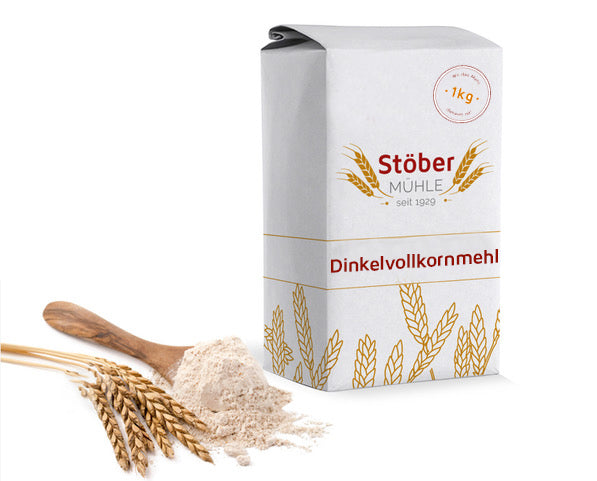Bake Affair
Wholemeal spelt flour
Wholemeal spelt flour
- Alternative to wheat flour
- suitable for conscious nutrition
- contains all the power of the spelt grain
- Good ingredients: the fiber-rich shell, the endosperm, the germ with natural vital substances
(Discount will be automatically deducted at checkout)
Couldn't load pickup availability

Important to know...
What makes spelt flour so special
Spelt flour is probably the best known of the ancient grains. It is therefore only logical that this type of flour is also produced in our mill.
In contrast to wheat, there is a well-known distinguishing feature.
The spelt grain is not exposed after harvesting, as is the case with wheat grain. Instead, the "Triticum Spelta" (spelt) is wrapped in a robust protective shell, the husk. This is where the name husked grain comes from. This type of grain also thrives optimally in the Waldviertel and that is the reason why we mainly source it from there.
Origin and age
According to historical records, the grain was first cultivated in Egypt around 8,000 years ago. It eventually came to Central and Northern Europe as a result of the great migration of peoples.
The complex processing of spelt grain
In a special process called "tanning," the grain is first carefully peeled from the husk after harvesting. Only then can it be processed further. This is probably also the reason why many millers still prefer wheat flour, which is less time-consuming to produce.
Its healing powers
Anyone who is highly sensitive to gluten will probably be very happy with this type of flour.
Since the spelt grain is hardly cultivated any further, the protein and gluten structure remains almost unchanged. This fact ensures better tolerance and those affected have significantly fewer complaints when eating spelt bread or spelt pastries.
Compared to wheat, spelt flour also provides more trace elements and minerals. The proportion of silica is also much higher and this has a positive effect on the growth of hair and fingernails.
When you eat our Fredi spelt flour, you also get an extra portion of the feel-good hormone serotonin. That's why this type of grain is generally considered a "mood enhancer".
Pastor Sebastian Kneipp even discovered the grain as a coffee substitute, because he roasted it. Even today, you can still buy delicious spelt coffee in specialty shops. This hulled grain is therefore very versatile.

